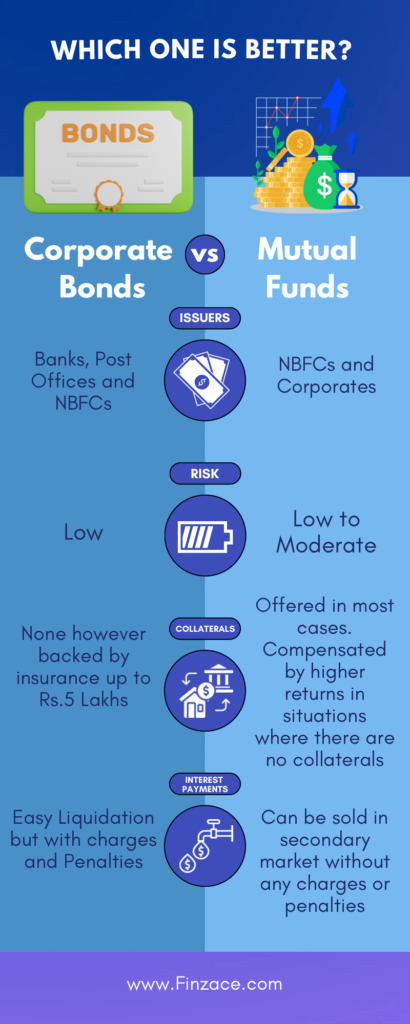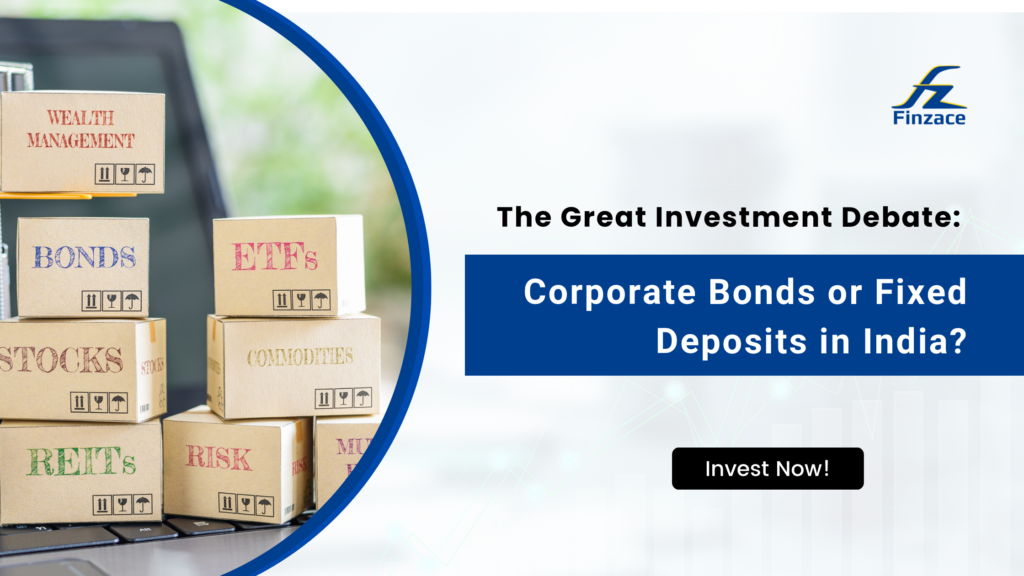Introduction:
Arjun sat at his desk, frustrated with the low returns from his fixed deposits. He had heard about the higher yields of corporate bonds but was hesitant to explore them. One day, he came across Finzace, an investment app promising high returns and secure options.
Curious, Arjun downloaded the app and was impressed by its user-friendly interface and wealth of information. He learned that corporate bonds had consistently outperformed fixed deposits, offering 6-8% returns over the past 20 years. The app also highlighted the stability and predictability of fixed deposits, catering to conservative investors.
Encouraged by the comprehensive market analysis and future projections, Arjun decided to diversify his portfolio with Finzace. He explored a range of high-yield corporate bonds and low-risk NCDs, appreciating the detailed information on risk, liquidity, and returns.
Within weeks, Arjun saw his investments grow, providing him with the financial boost he had been seeking. Thanks to Finzace, he found a balance between high-return investments and low-risk options, securing his financial future with confidence.
Join Arjun as he delves into the intricacies of corporate bonds and fixed deposits, helping you find the best safe investments with high returns. Welcome to a world of financial growth and security with Finzace.
Historical Performance:
Corporate bonds have outperformed fixed deposits, which have generally yielded around 3-5% over the previous 20 years, with an average annual return of almost 6-8%. This historical data shows that corporate bonds have the potential to yield larger returns than fixed deposit options, which are considered to be more cautious.
Current Market Analysis:
Corporate bonds currently offer yields between 5 and 7 percent, depending on the credit grade and the length of the maturity period; fixed deposits, on the other hand, yield returns between 2 and 4 percent. Given the current low-interest rate environment, investors seeking greater yields will find corporate bonds appealing due to this discrepancy in returns.
Behavior and Volatility:
As a result of their susceptibility to credit risk and market conditions, corporate bonds have more return volatility than fixed deposits. Corporate bonds are subject to value swings that stem from issuer performance and economic conditions, while fixed deposits provide a steady and predictable return during the investment duration. For investors who don’t mind taking on a little risk, corporate bonds are a more dynamic choice because of their variable yield.
Future Projections and Outlook:
Forecasts indicate that corporate bonds will continue to yield yields that are competitive when compared to fixed deposits. Corporate bonds are predicted to continue to return more than fixed deposits due to predictions of a gradual economic recovery and possible interest rate changes. Corporate bonds could be a viable way for investors to increase their returns provided they have a lengthy investing horizon and are prepared to diversify their holdings.
History and Evolution
Corporate Bonds: Since their legalization in the 1990s, corporate bonds have seen a substantial evolution in India. Government bonds dominated the market at first, but corporate bonds gained popularity as businesses looked for funding options outside of conventional bank loans. Investor confidence has steadily increased as a result of regulatory authorities like SEBI’s ongoing efforts to improve transparency and investor safety.
Fixed Deposits (FDs): Because of its perceived safety and ease of use, FDs have been a mainstay of Indian savings for many years. The market for fixed-rate notes (FDs), which were previously only available from banks and post offices, has grown to include corporate organizations and non-banking financial corporations (NBFCs), offering higher interest rates than bank FDs.
Current Market Dynamics
Corporate Bonds: While the Indian market for corporate bonds has expanded, individual investors still choose FDs over them. Bonds have risks such as credit and interest rate risk, but they can offer higher yields and diversification. Currently, bonds from highly rated corporations offer attractive rates that frequently outpace those of fixed deposits.
Fixed Deposits (FDs): For investors who are risk averse, FDs remain the most popular choice. They are simple to open and handle, and they guarantee returns. The best interest rates on FDs are typically offered by smaller banks and NBFCs. Interest rates on FDs have remained very modest yet constant.
Behavior and Performance
Corporate Bonds: Bonds generally offer higher returns, especially those with longer maturities and from lower-rated issuers (albeit with higher risk). They are more liquid than FDs as they can be traded in the secondary market. However, the awareness and accessibility of bonds are still limited among retail investors in India.
Fixed Deposits: FDs are considered extremely safe, particularly those from reputable banks, and offer guaranteed returns unaffected by market fluctuations. They are less liquid as withdrawing before maturity usually incurs penalties. FDs are straightforward to manage, making them suitable for conservative investors.

Future Projections
Corporate Bonds: As regulatory improvements increase their transparency and accessibility, the market for corporate bonds is predicted to expand. It is anticipated that more ordinary investors will be drawn to bonds by growing internet platforms and government programs aimed at promoting financial awareness. company bond issuance will be further stimulated by the focus on infrastructure development and company expansion.
Fixed Deposits (FDs): FDs will remain popular, particularly with senior residents and cautious investors who choose capital preservation above high returns. Nonetheless, a gradual move toward more diversified portfolios, which include bonds and other investment vehicles, may occur as financial literacy increases.
Key Considerations
- Risk: Although corporate bonds have larger potential rewards, they also come with greater credit and interest rate concerns. FDs offer assured profits with low risk.
- Liquidity: Because bonds can be exchanged, they are more liquid than mutual funds (FDs), which have early withdrawal penalties.
- Returns: Over longer time horizons, bonds usually provide larger returns than FDs.
- Taxation: Bonds may provide tax advantages based on the kind and issuer, whereas interest on FDs is taxed according to individual income tax slabs.
What is the Current Situation of Mutual Funds & Corporate Bonds in India?
Here is a concise overview of the current situation of mutual funds and corporate bonds in India:
Corporate bond mutual funds are a popular debt investment option in India. These funds invest at least 80% of their assets in highly-rated corporate bonds (AA+ or above), providing investors with a relatively safe way to earn higher returns than fixed deposits over the long term.
Some key advantages of investing in corporate bond funds include:
- Diversification across a portfolio of corporate bonds to reduce risk
- Professional management by experienced fund managers
- High liquidity, allowing easy access to funds
- Risk mitigation through thorough asset allocation and monitoring
- Accessibility for small investors to a debt portfolio they couldn’t build individually
Corporate bond funds have evolved as an attractive option for investors seeking a balanced and potentially profitable portfolio in the current environment with varied investment choices. Top corporate bond funds in India include HDFC Corporate Bond Fund, Aditya Birla Sun Life Corporate Bond Fund, ICICI Prudential Corporate Bond Fund, and Sundaram Corporate Bond Fund.
However, investors should still proceed cautiously and pay attention to factors like safety and interest rate changes. While corporate bond funds are relatively safer than other debt funds, they do carry some risk. Investors should ensure fund managers are
Conclusion:
Through a thorough examination of past performance, present market patterns, and forthcoming forecasts for corporate bonds and fixed deposits, investors can acquire a significant understanding of the possible gains and hazards linked to every investment choice. While corporate bonds offer portfolio diversity and greater returns, fixed deposits nevertheless provide stability and security. In the end, a person’s risk tolerance, investing objectives, and market outlook should all be taken into consideration when choosing between corporate bonds and fixed deposits.
In conclusion, both corporate bonds and fixed deposits present viable options for investors in India, each with its unique advantages and risks. Corporate bonds offer higher returns and the potential for portfolio diversification, making them a compelling choice for those willing to embrace a bit more risk. Fixed deposits, on the other hand, provide a secure and predictable return, ideal for conservative investors seeking stability.
For those looking for the best safe investments with high returns, Finzace stands out as the premier investment app. Whether you are seeking high-return fixed-income investments or low-risk investment options in India, Finzace offers tailored solutions to meet your financial goals. The platform enables easy access to secured investment options like high-yield corporate bonds and investment in NCDs (Non-Convertible Debentures), ensuring that you can maximize returns while minimizing risk.
Finzace also caters to those looking for the best short-term fixed-income investments, offering a curated selection of bonds and deposits with attractive yields. By leveraging the expertise of our experienced fund managers and the user-friendly features of our app, you can confidently navigate the investment landscape and achieve your financial objectives.
Join Finzace today and explore the world of high-return fixed-income investments with the assurance of low-risk investment options in India. Let us help you find the best safe investments with high returns to secure your financial future.

